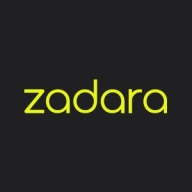

In the cloud services category, Zadara competes with AWS Fargate. While both offer robust solutions, AWS Fargate has an edge due to its ease of container deployment and scalability without extensive infrastructure management.
Features: Zadara offers integration with cloud solutions such as Amazon EC2, providing a low-latency connection and a dedicated managed service approach. It provides flexible storage options with comprehensive disaster recovery solutions. AWS Fargate is self-managed, allows deploying containers easily, and scales without requiring management of infrastructure. Its serverless nature enables more focus on applications.
Room for Improvement: Zadara faces challenges with slower feature rollouts and needs better multi-protocol support and reporting tools. Enhancing update disclosures and pricing could help. AWS Fargate needs improved cost predictability, setup simplicity, support for multi-container setups, and better monitoring features. Configuration complexity and pricing are notable concerns.
Ease of Deployment and Customer Service: Zadara supports hybrid cloud and on-premises deployments, with proactive 24/7 customer service. AWS Fargate offers public cloud-focused deployment with robust support, but with user management for optimal settings, it may lack the same proactive level of engagement as Zadara.
Pricing and ROI: Zadara provides predictable, pay-as-you-grow pricing with good value and savings over traditional setups. Despite higher initial costs, its model is flexible with no hidden fees. AWS Fargate offers on-demand pricing but can be expensive for smaller businesses. Its scalability helps manage costs, though overall costs may be significant if not configured carefully.
The pay-as-you-go pricing model of AWS Fargate was one of the major drivers for us to move there because we reduced costs while increasing the quality of the processing services by about 30%.
The cost is not cheaper compared to AWS, and we have not seen the expected return on investment.
Even though we didn't contract support, every two weeks I had a 30-minute meeting with a cloud architect from AWS to help our team use different products of AWS, especially with SageMaker for a forecasting algorithm we were developing.
I rate the technical support from Zadara as nine out of ten.
We lack adequate response times and a 24/7 service level agreement.
Zadara is a fully-fledged platform, and our customers are happy with its use.
For a company that does not require complexity or managing Kubernetes clusters, AWS Fargate is a great way to go.
Adding AI capabilities could enhance the offering as well.
Maintenance can also be complicated, especially when deeper troubleshooting requires navigating the CLI and searching for logs.
The pricing is considered expensive.
One of the best features of AWS Fargate is that it was useful for us because we didn't require to run container workloads and we didn't need to deal with the management of a Kubernetes cluster directly, and the ability to run those workloads just in a scheduled manner is also a great feature.
The most valuable feature is its storage management capability.
Zadara's troubleshooting feature is very valuable for me.


A new compute engine that enables you to use containers as a fundamental compute primitive without having to manage the underlying instances. With Fargate, you don’t need to provision, configure, or scale virtual machines in your clusters to run containers. Fargate can be used with Amazon ECS today, with plans to support Amazon Elastic Container Service for Kubernetes (Amazon EKS) in the future.
Fargate has flexible configuration options so you can closely match your application needs and granular, per-second billing.
Zadara is a powerful enterprise-level storage solution whose design enables it to handle every aspect of a user’s data storage needs. It can be deployed in any location, using any protocol, and storing any data type that an organization requires. With Zadara, organizations can do everything that they were able to do with more traditional systems in a cheaper and more efficient way.
Zadara Benefits
Some of the ways that organizations can benefit by choosing to deploy Zadara include:
Zadara Features
File analytics. Organizations can leverage a powerful analytics package that can provide them with critical insights. These tools can help users sort through their data and make more informed data management decisions.
Reviews from Real Users
Zadara is a highly effective solution that stands out when compared to many of its competitors. Two major advantages it offers are its extensive suite of cloud solution integrations and its object storage capability.
Steve H., the chief technology officer at Pratum, writes, “One of the most valuable features is its integration with other cloud solutions. We have a presence within Amazon EC2 and we leverage computer instances there. Being able to integrate with computing, both locally within Zadara, as well as with other cloud vendors such as Amazon, is very helpful, while also being able to maintain extremely low latency between those connections.”
Mauro R., the CEO of Momit SRL, says, “The object storage feature is wonderful. With traditional storage, you have a cost per gigabyte that is extremely high or related to the number of disks. With Zadara Storage Cloud, you have a cost per gigabyte that you can cut and tailor to your needs independent of the number or size of the disks.”
We monitor all Compute Service reviews to prevent fraudulent reviews and keep review quality high. We do not post reviews by company employees or direct competitors. We validate each review for authenticity via cross-reference with LinkedIn, and personal follow-up with the reviewer when necessary.